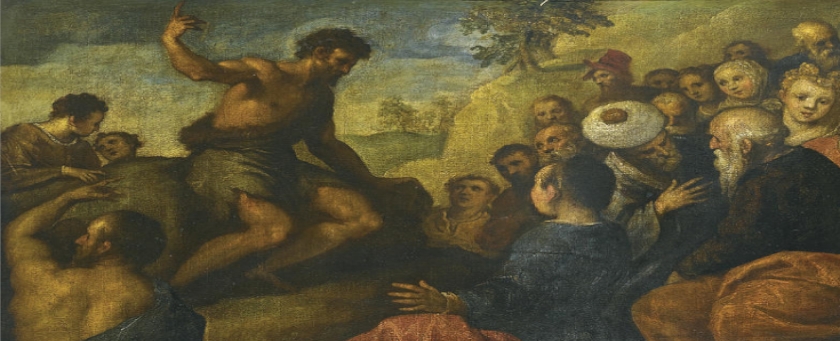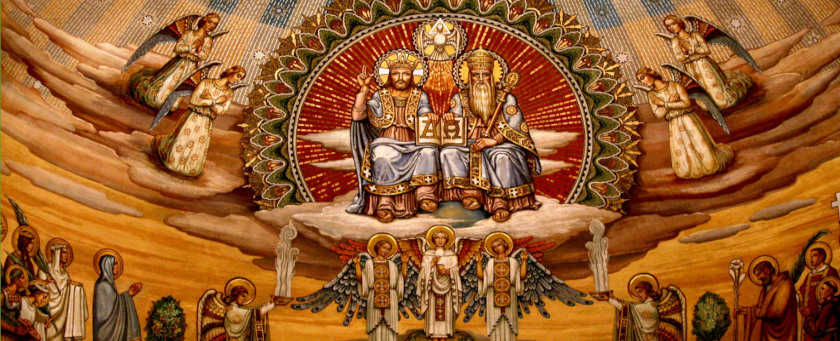John the Baptist Shows Us the Way to Jesus
Second Sunday of Advent, Year A

Readings:
Is. 11:1-10; Ps. 72; Rom. 15:4-9; Mt. 3:1-12
(Audio recorded live, 4 December 2022)
In his letter to the Romans, St. Paul says, “Whatever was written previously was written for our instruction, that by endurance and by the encouragement of the Scriptures we might have hope.” He is speaking of the Sacred Scriptures, which not only foretell the coming of the Messiah, but also his triumph over his enemies. He wants us to look to the Scriptures like the Israelites did, so that they may be a source of hope, encouragement, and endurance for us. The goal is to be of one heart and one voice giving glory to God the Father through Christ. It was Christ who came first to the people of Israel, fulfilling the Scriptures, and it is Christ who is a light to the Gentiles, that all people may sing praises to his name.
During the Season of Advent, we have this same sense of hope as we look forward to the celebration of Christmas. But, the hope that was once for the first coming of Jesus is, for the Christian, a hope in his return. So, we at one and the same time celebrate his Nativity as well as look forward to his second coming. For many, it would seem the second coming is immanent. Many of the signs given in the gospels and throughout the New Testament appear to be manifest, whether that be the tensions within families, especially regarding matters of faith, wars and insurrections, injustice for the poor, natural disasters, and the like.
With respect to certain natural phenomena, I would like us to consider that these kinds of things would happen whether we were here or not. There will be earthquakes, storms, volcanic eruptions, and there is little we can say or do about it. Therefore, such natural phenomena are part of God’s Creation. There is a Natural Law, which applies to all of Creation: Simple premises like, “What goes up must come down.” We may fantasize about throwing a baseball to the Moon, we know that it is impossible because of the laws of nature.
While there are many natural phenomena that affect us, when something gets destroyed, we rebuild. Many were affected by hurricane Sandy, but we were Jersey Strong. It was the same with Katrina and countless others throughout the ages. But, people band together.
There are other situations, however, that are independent of nature, and can cause an even greater amount of damage, especially to people. This would be the situation of war, or of corruption in government, or of dishonest business practices. With every war there is the opportunity to establish peace terms, but the arrogance of men often gets in the way. Because of this, people suffer, and in greater ways than storms or earthquakes. We often overlook the psychological component of war. Part of the reason Hitler was able to rise to such power was because of the psychological state of the German people after WWI. They were so psychologically defeated after the war that they entered into a terrible depression. Perhaps the greater battle was so much in the trenches, but of the mind.
We have been subject to similar situations in recent history, and there have been people warring against our minds. Psychological warfare is not one of the Church’s greatest strengths. We are often left confused and are ill equipped to respond. Some examples of psychological warfare include political correctness, avoiding certain words so as not to offend anyone. Just this one attack on the psyche of millions has empowered a whole generation of people to fall for the lie that they are anything other than what God has created them to be.
So much of dealing with these issues has to do with pinpointing them, identifying them for what they are, and then acting accordingly. As for those who struggle, it is up to us to help them come to Christ, for he is the way, and the truth, and the life. Only he can usher in an era of peace, but we must first overcome the war. That can only be done with his help, by his grace, and by surrendering our lives in all humility to him, joining with John the Baptist who says, “I am not worthy to carry his sandals.”
Jesus Christ is the signal to the nations, he is the light to the Gentiles, and his dwelling is indeed glorious, where he sits at the right hand of the Father. We have been called to follow him, not only in life, but also in death, that in the resurrection we may be with him in glory. This can only happen if we make straight his paths. So, let us be gathered with one voice, as wheat into his barn, as witnesses before the mobs of those who would threaten our faith, and as lovers of Almighty God.





Twitter
Facebook
Pinterest
Email